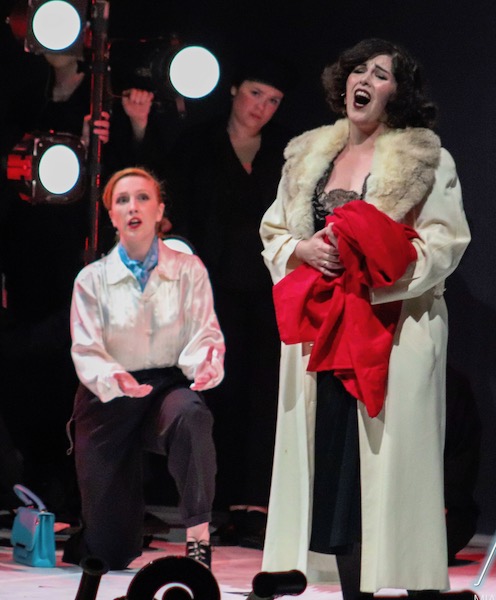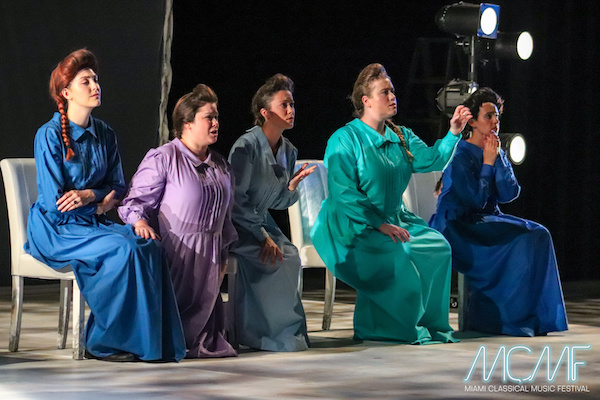Miami Music Festival scores with one-act operas by Golijov and Muhly

The Miami Music Festival presented Osvaldo Golijov’s “Ainadamar” with Maggie Kinabrew (seated) and Alejandra Martinez Saturday night at Miami Beach High School. Photo: Angelica Perez
The opera component of the ambitious Miami Music Festival debuted at a new venue Saturday night with an adventurous double bill of works by major contemporary composers. Osvoldo Golijov’s Ainadamar and Nico Muhly’s Dark Sisters offered contrasting stylistic approaches to melding classical currents with theater. The auditorium at Miami Beach High School proved an inviting platform.
More intimate than the festival’s former home at Barry University, the school auditorium has adequate stage facilities and the acoustic, particularly in the unamplified Muhly score, was surprisingly live and present. Orchestral sound seemed more recessed but the balances between pit and stage (especially in Golijov’s work in which amplification is written into the score) worked remarkably well under the experienced baton of conductor Francesco Milioto.
Golijov’s 2004 Spanish language opera—with libretto by playwright David Henry Hwang—is a rumination on the relationship between actress Margarita Xirgu and writer Federico Garcia Lorca, along with their ideological bond with 19th-century Spanish martyr Mariana Peneda. As Xirgu and her acting company prepare to stage a production of Lorca’s play about Pineda in the 1960’s, the actress recalls to her protégé Nuria the story of the drama’s creation, her unsuccessful attempt to get Lorca to join her on a tour to Havana where he would be safe from the violence and bloodshed of the Spanish Civil War, and his execution by the forces of Fascist leader Francesco Franco, Spain’s dictator.
Golijov’s emphatic rhythms evoke gypsy, Latin, Judaic and Arabic influences in a hotly brewed musical gumbo and flamenco runs through the score as a leitmotiv. The role of Xirgu is a tour de force for a singing actress, rising to heated levels of emotion as her recollections turn tragic. Golijov’s panorama of choral and orchestral writing (including guitar and both live and taped percussion) is irresistible in its velocity and Hwang’s dramaturgy is consistently gripping.
The cast of young student and professional singers was fully equal to the opera’s formidable demands. As Xirgu, Alejandra Martinez’s multi-hued vocal palette was consistently rich and beautiful. Her top notes rang freely and without strain and she brought tremendous fervor and forceful projection to Xirgu’s narrative of Lorca’s fate. Maggie Kinabrew’s lighter timbre aptly suggested Nuria’s kind-hearted innocence and she rode the role’s high tessitura impressively.
One of Golijov’s master strokes was to cast Lorca as a mezzo. Kristyna Gocová cut a handsome figure as the poet, playwright and activist. She had the gutsy low notes and strong top needed to trace Golijov’s winding phrases and divergent contours. In trio, Martinez, Kinabrew and Gocová’s voices melded seamlessly, the shimmer of their differing ranges artfully displayed.
Alejandro Salvia’s flamenco inflected cries of “Give him up..Finish him” were chilling as the officer in Franco’s army called for Lorca’s blood. José Vazquez brought baritonal heft to the role of a well intentioned priest and Eric Viñas and Max Alexander Cook effectively played Lorca’s fellow martyrs.
The Greek female chorus of Xirgu’s acting company sang with warmth and strength. From the opening offstage trumpet over muted strings to the pulsating Cuban rhythms of the Havana scene and the eerie marimba forecasting Lorca’s doom, Milioto drew splendid playing from the student orchestra. His tautly controlled direction evoked the score’s color and passion.
Director Jennifer Williams’ production smoothly segued between Xirgu’s dressing room, the performance of the play on stage, and flashbacks to Spain and Cuba. Against Alyiece Moretto’s unit set, Steven Convey’s projections of Picasso-like suggestions of suffering, the ravages of war and Xirgu and Lorca on and off stage were strikingly effective. Julia LaVault’s subtle lighting underscored moments of drama and joy. Patricia Hibbert’s costumes captured the theatrical ambience in varied tones and the war in bleak hues. In a striking climax to Williams’ pitch perfect staging, Nuria assumes the role of Pineda as Xirgu joins Lorca in death.

Nico Muhly’s “Dark Sisters” was presented by MMF on the second half of Saturday night’s double bill. Photo: Angelica Perez
Nico Muhly is very much the opera composer of the moment. Two of his works (Two Boys and Marnie) have been produced at the Met and his choral and instrumental works have been widely played.
The inspiration for Dark Sisters was a 2008 raid, after accusations of child abuse, on a ranch in Texas occupied by a breakaway fundamentalist offshoot of the Church of Jesus Christ of Latter Day Saints. (The group does not recognize the Mormons’ outlawing of polygamy.) While the conflict between freedom of religion and governmental law and societal norms form the opera’s basis, Muhly and librettist Stephen Karam avoid making grand social or political statements. Instead they focus on the women and their reaction to having their children taken away and their relationship with The Prophet, their husband.
“Stay sweet” is the command running through the 90-minute work, meaning total obedience to the patriarch of the enlarged family. The same can be said for Muhly’s score, which skillfully substitutes subtlety for overheated melodramatics, making the opera all the more compelling for that. This is minimalism with a heart rather than relentless pounding figures; the chamber orchestration is wonderfully light and understated. Ensemble choruses for the wives have a touch of the Poulenc of Dialogues of the Carmelites. Muhly’s musically gentle delineations of the principal characters are consistently engrossing and, ultimately, moving in climactic scenes.
Aliza, the wife who has doubts about the cultish subservience, is the most fully developed character. At first reticent, she drops a bombshell when the group appears on a television talk show, telling about her experiences as a child bride and revealing that her teenage daughter has been promised to a 56-year-old man. Ultimately she leaves the group while her daughter Lucinda, a true believer, decides to stay. Sophie Thompson portrayed Aliza’s wariness and ultimate courage with a lyric soprano of great sweetness and delicacy. The anger she projected at hearing of the plans for her daughter’s wedding was potent and poignant, particularly after her reluctant quietude in the early scenes.
The strength and cutting edge of Emily Kerrigan’s mezzo conveyed the anguish of Ruth who has lost both of her children to illness and drowning. Muhly paints the scene of Ruth’s suicide, as she jumps from a mountain, in supple vocal and instrumental shades (vividly employing harp lines), avoiding overheated theatrics. Kerrigan’s dignity and mellow sound matched the instrumental pulse.
Vazquez’s firm baritone and dignified demeanor encompassed The Prophet’s authority with a touch of fanaticism. His English diction was exceptionally clear. In the talk show segment, Vazquez doubled as Larry King (in his signature outfit of blue shirt, tie and suspenders) trying to drum up sensationalist rhetoric from the carefully scripted women. (Here Muhly and Karam wryly comment on the 24-hour-news cycle’s propensity to substitute conflict, controversy and sound bites for reasoned discussion of issues.)
Samantha Frischling gave a scene-stealing performance as Almera, a woman who subsumes her doubts in hopes for reunion with her mother and grandmother in the afterlife. Her soprano had terrific force and each word and phrase was telling. Anna Martin as Presenda and Charlotte Jackson as Zina conveyed the irony and jealousy in their well-sung duet as they contemplate who The Patriarch may spend the night with. Sara Mortenson’s soaring soprano gave depth to Lucinda’s brief pronouncements.
Milioto’s conducting superbly emphasized the warmth and humanity of Muhly’s writing and the blended women’s voices soared in chorales. Williams’ spare staging cut to the heart of the drama, keeping the emphasis on Aliza’s dilemma and the wives’ faith. Hibbert’s costumes (in blues and whites) emphasized the simplicity and conformity of the compound.
The festival next turns to Mozart (The Magic Flute and The Marriage of Figaro) and Baroque operas (by Monteverdi and Lully) before a staging of Wagner’s The Flying Dutchman at the Arsht Center.
The Miami Music Festival presents Mozart’s The Magic Flute 7:30 p.m. June 27 and July 26 and 1 p.m. June 30 and July 28 at Temple Emanu-El, 1701 Washington Avenue in Miami Beach.
The festival presents Mozart’s The Marriage of Figaro 7:30 p.m. June 28 and 29 and July 26 and 27 at Miami Beach High School. miamimusicfestival.com
Posted in Performances
Leave a Comment
Sun Jun 23, 2019
at 1:39 pm
No Comments





